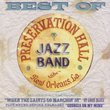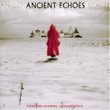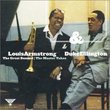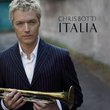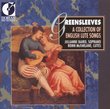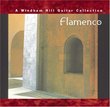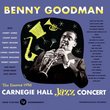| All Artists: Gregorio Paniagua, Greek Anonymous, Madrid Atrium Musicae Title: Musique de la Grece Antique Members Wishing: 0 Total Copies: 0 Label: Harmonia Mundi Fr. Release Date: 10/10/2000 Album Type: Import, Original recording reissued Genres: Special Interest, Pop, Classical Styles: Vocal Pop, Opera & Classical Vocal, Chamber Music, Historical Periods, Early Music, Sacred & Religious Number of Discs: 1 SwapaCD Credits: 1 UPCs: 794881601622, 079488160162 |
Search - Gregorio Paniagua, Greek Anonymous, Madrid Atrium Musicae :: Musique de la Grece Antique
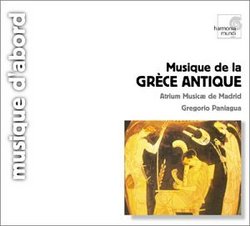 | Gregorio Paniagua, Greek Anonymous, Madrid Atrium Musicae Musique de la Grece Antique Genres: Special Interest, Pop, Classical |
Larger Image |
CD DetailsSimilar CDsSimilarly Requested CDs
|
CD ReviewsBeauty can survive destructive time Jacques COULARDEAU | OLLIERGUES France | 04/27/2006 (5 out of 5 stars) "The first remark concerns the instruments of this music, instruments that have been reconstituted on the model of the ancient ones. We will consider them as germanely faithful, and they create sounds, a sound environment or ambience that is particularly original. The second remark is that this music is based on the pythagorian five-note scale that corresponds to the first five degrees of our modern major scale. Then a second group of these five degrees and intervals are added to the first five in a second identical group constituting a ten-note scale that will be the basis of all western music up to the Renaissance, and thus the basis of all Christian sacred music of the Middle Ages, a music known as gregorian. So, in this surprising sound ambience we also recognize some elements we have already heard and enjoyed in our heritage. Just take track # 3, ? Premier hymne delphique ? Apollon ?. Some of the chords are so close to gregorian music, and yet the instruments are so different, that we may think we are at the crossroads between some extraterrestrial music and gregorian chanting. In fact we are here at the very source of gregorian music that was to borrow everything from ancient Greek music. And then put this track # 3 in parallel with track # 16, ? Hymne chr?tienne (sic) d'Oxyrhynchus ? and you will hear the direct filiation. Track # 8 will provide you with the model of the traditional musics we find in the mountainous areas of the Mediterranean, Sicilia, Sardinia, Corsicca and Provence, among others, the music of shepherds and fishermen when coming back to land, a music that will become religious and christian later on and that still exists, mainly in the form of a polyphony. But the worst part - and also the best in a way - is that we only have fragments, tidbits, and that it is the concrete realization of the tremendous waste history has willed us and yet also the concrete evidence that history is never able to destroy something completely and that we have the means to reconstruct what has been destroyed with a specific procedure of genetic musical archaeology. To conclude we must take into account this recording is from 1978, i.e. a long time ago. To get a more complete vision we have to look for more recent recordings. Dr Jacques COULARDEAU, Universit? Paris Dauphine, Universit? Paris I Panth?on Sorbonne" A Wild Journey into the Unknown Irene Rheinwald | Montreal, Quebec, Canada | 11/20/2007 (5 out of 5 stars) "This is one of the most - if not the most - peculiar recordings I own. Introduced to me by the owner of a classical music store/musician, I was at first stunned by the shock of primaeval rhythms and atonal soundscapes; but the intensely curious historian in me piqued my attention. Different from anything (I deliberately seek out the strange and unusual in music) we might hear in the world today, this album transports me into an almost hypnotic state in which my imagination runs rampant across the centuries. As a historian, I crave the full experience of past cultures: art, music, science, society, philosophy, politics, any aspect that deepens my understanding and knowledge. I love the impeccable research that went into this production: the reconstruction of ancient Greek instruments based on sculptures and vases, the reconstruction of contemporary notations, and the attempt at ancient pronounciations (very strange). I am aware of the differences between ancient and modern Greek as my mother has studied ancient Greek for decades - she owns scholarly recordings of individuals speaking Homerian Greek for the stage (unnatural, drawn out, with crescendos and diminuendos). How accurate is mere supposition. But this recording is strikingly similar. Also fascinating is that manuscript (papyri) gaps were filled in with logic and imagination; what painstaking work. Even so, the compositions are short. It is not entirely ancient Greek: there is Roman piece, and post CE pieces. This does not interfere with the overall impression, however. The sounds here are not melodic, but dissonant, rough, grating, sharply delineated, but utterly compelling. And if one listens long enough, there is a method to all this madness, much like peeling an onion: persistence pays off, and further layers of delight are revealed. As a side note, I have often played this for friends, even those whose tastes are more conventional than mine. Everyone has loved it. A favourite; a treat for the senses. " Musique de la Grece Antique: Sherri's Opinion Lynn Paxton-Romine | 04/11/2007 (5 out of 5 stars) "This music is almost like hearing ghosts. In a way the listener does hear ghosts, for the music has been saved from oblivion, and experts do not know everything about it. As much as possible, traditional instruments have been reconstructed based on pictures found on documents like vases and paintings. Sometimes you hear only a little fragment of something, about a minute. It's intriguing to think about who may have sung/played this music. The notes explain some of the technical details; musicologists will find that interesting. Because I know little about music, I wish for better notes about other things. For example, I would like more information in English about provenance, titles, and lyrics--as far as they are known. I wanted to know the words I heard sung. Other than the shortage of helpful notes, this is very interesting music."
|



